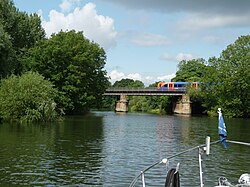Black Potts Railway Bridge carries the railway from London (Waterloo) to Windsor, Berkshire across the River Thames. The Staines to Windsor & Eton Line terminates immediately after the bridge at Windsor and Eton Riverside railway station. The bridge crosses the Thames on the reach above Old Windsor Lock, shortly before Romney Lock.
Black Potts Railway Bridge | |
|---|---|
 Downstream side of Black Potts Bridge | |
| Coordinates | 51°29′33″N 0°35′49″W / 51.4926°N 0.597°W |
| Carries | Staines to Windsor & Eton Line |
| Crosses | River Thames |
| Locale | Windsor |
| Maintained by | Network Rail |
| Characteristics | |
| Material | Iron |
| Height | 19 feet 6 inches (5.94 m)[1] |
| History | |
| Opened | 1850 |
| Location | |
 | |
History
editIn 1849 the Windsor Staines and Richmond Railway sought leave to erect a temporary crossing here and the bridge was opened in 1850.[2] The opening delay was caused by the collapse of one of the piers on the day before inspection.[3] The bridge is supported in the middle by Black Potts Ait. Originally the bridge had ornate cast-iron ribs, but these corroded and were replaced with more utilitarian wrought iron girders, which radically altered the bridge's appearance.
Black Potts Viaduct
editImmediately to the east of the bridge is the Black Potts Railway Viaduct. This had to be provided with substantial protection[4] when the Jubilee River was constructed, as the outfall of this channel passes through the brick arches of the existing Victorian viaduct, just downstream of the Black Potts Railway Bridge.
See also
editReferences
edit- ^ River Thames Alliance. Bridge heights on the River Thames.
- ^ Fred. S. Thacker The Thames Highway: Volume II Locks and Weirs 1920 - republished 1968 David & Charles
- ^ Thames web on the Windsor bridges
- ^ "Detail photo of viaduct protection". Archived from the original on 2 October 2011. Retrieved 17 October 2007.